“Being responsible is being responsive” – An interview with Kriegsbilder
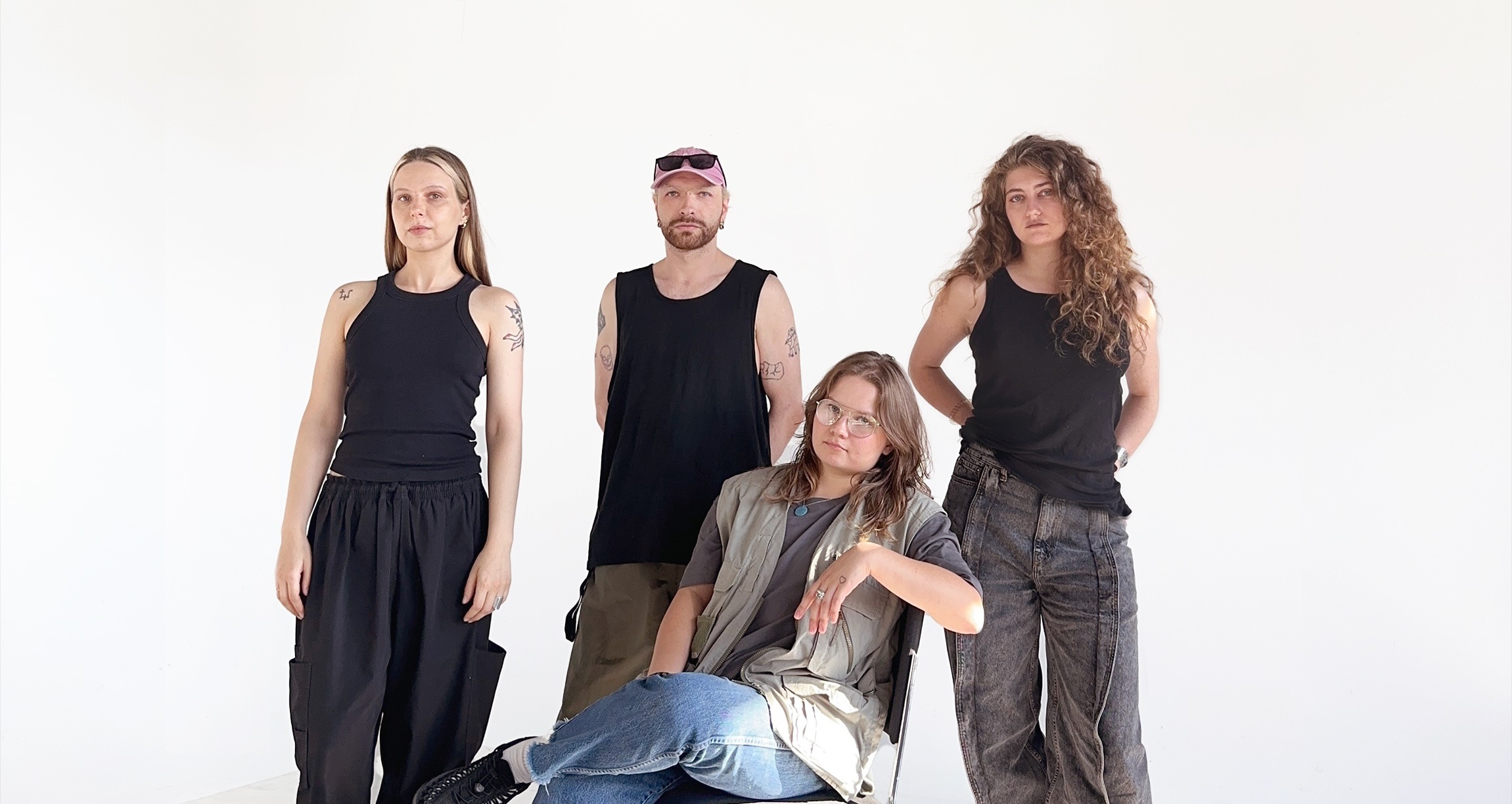
“the drive to do something, to act even if you are far away”
Rita Kulyk, the fourth member of the core team, contributed by answering a few questions remotely, as she is currently in Kyiv and was unable to attend the interview in person.
Margo Dubovska is a Kyiv-born artist, dj and co-curator currently based in Vienna. Working primarily with sculptures, she addresses major current political and social issues through her personal experiences. Next to her artistic practice, Margo Dubovska co-founded Vienna based event series Kriegsbilder, where she currently is a co-curator and graphic designer.
Leo Trotsenko is a process-based artist and co-curator from Ukraine living in Vienna. Leo was the co-founder of Periscope_ua (UA), a photographic initiative, and Kyivpastrans record label (UA). Now he is a co-curator of the culture initiative Kriegsbilder in Vienna. Strong connections on history of art and music, attention to subcultures and micro communities, ”funny” effect and simplicity are the main core of Trotsenko´s projects. Main medium of his work is installed “situation” based on sculpture, drawing, video and embroidery.
Yuliia Sudarchykova is a Ukrainian photographer and filmmaker from Kyiv, currently based in Vienna. With a background in photography, video, and visual communication, she has worked and volunteered with organizations like Modern Ukrainian Cinema (UA), DocuDays IFF of Human Rights (UA), Kyiv IFF Molodist (UA). Nowadays she is a part of the curatorial collective Kriegsbilder (AT).
Rita Kulyk is a Ukrainian artist and production designer currently based in Vienna, Austria. Her artistic practice is based on a combination of digital and analog techniques in virtual and genuine spaces. Kulyk blends personal, political, and historical contexts juxtaposing fragility and destruction in the interdisciplinary approach to art. Her production designer background includes short and feature films that have been screened at FIAPF-accreditation film-festivals like Karlovy Vary, San Sebastian, Venice and many others. Rita is a co-founder and a program co-curator of a cultural initiative “Kriegsbilder” in Vienna.
Kriegsbilder’s first event was hosted in March 2022, about three weeks after Russia’s full-scale war of aggression on Ukraine. In the beginning you worked primarily with film screenings, can you tell us a bit about how the project came about – was it the same group of people as you are now?
Rita: During the first few weeks of the full-scale invasion, we tried various ways to help: we collected and sent humanitarian aid, bought thermals and other gear from military stores across Vienna, power banks from Media Markt. We even tried to get bulletproof vests, with no luck. Quite quickly, my friends and I realized that we weren’t effective at this type of volunteering, as there were enough people already dealing with these matters much better than we did.
At that time, there was almost no representation of Ukraine and its context through its culture in Vienna, so the idea of organizing a charity screening of Ukrainian films seemed reasonable.
Like many good ideas, this one came to me during one of my sleepless nights, and I immediately shared it with my husband, who said it made perfect sense.The next day, I told my friends and groupmates (there were eight of us at the beginning) about it and received their full support. After a while our initiative found support from the international film festival This Human World and the Schikaneder cinema, which provided us with a venue for screenings for a year. We were also supported by LOFT, Spektakel, Discotec and the art venue Bootleg.
Margo: When I fled from Ukraine, Rita already pitched the idea of Kriegsbilder to me. In the first weeks, I felt that the people who were already based in Vienna had a big sense of community and an urge to come together. So they organised gatherings, a lot of people volunteered, collected money and donations and quite quickly the group around Kriegsbilder formed. For us, it came from the drive to do something, to act even if you are far away and find out what the right way for this is, while also feeling guilt.
Guilt because of leaving?
Margo: Yeah, especially when you’re based somewhere relatively safe, you see the stories, you see everything in the media, you see your friends’ faces, you see the posts, and that obviously created a huge panic and when you feel safe, comparatively, you want to at least be helpful. That’s how Kriegsbilder started.
You started out with doing film screenings. Could you share your curatorial approach on that?
Rita: Yes, first of all the idea was to focus on organising the screenings of Ukrainian contemporary and classical films, because our aim was to have a comprehensive approach to introduce Ukrainian realities and culture to the Austrian public. As a production designer in the film industry it seemed as the easiest way from an organisational point of view and the desired message we wanted to bring. We realised that people here were mostly out of context of Ukrainian history, culture and the ongoing war. During these 3 years we showed different movies: shorts, fiction and non-fiction features, video art and classics. Our aim was to show the diversity and values that are under the constant threat of destruction. We got great support from the international film festivall This Human World, Schikaneder Cinema and Spektakel, which provided us with a platform to organise our screening once in a while.
Leo: I’ve only joined the collective about a year ago, so I can’t comment on the curatorial approach during the full-scale invasion, since I was still in Ukraine at that time. However, since I’m part of Kriegsbilder I can say that there have been different ways we think about moving images. The way we try to manage the curatorial part of film screenings is to think about topics, the audience, the occasion, the space and the context in which we’re gonna present our programme. So, for instance, the last screening was in February at MUMOK in collaboration with Office Ukraine, and it was dedicated to three years of the full-scale invasion. So, obviously on the 24th of February we were not going to show something funny or easygoing. At the same time we also didn’t want to be paternalistic or too educational, instead the priority was to show and remind what is happening in Ukraine. Additionally when we think about our audience, the people we want to reach, which is kind of 50:50 a Ukrainian community, as well as people from Austria, and internationals, we consider what is interesting and valuable for both these groups. Personally, I’m trying to think less about the Ukrainian community here, cause we are not primarily a community. It’s a sort of an epiphenomenon, because through our curatorial decisions the idea of a community appears naturally and fellow Ukrainians feel safe at our events and can come together there. So sometimes it’s more about who we can and want to reach beyond that.
Yuliia: I’d like to add that it is also a lot about introducing a culture that many people here might have certain stereotypes about and might not be so familiar with. For us it is also interesting to share our own understanding of this culture and through that you can also learn about the war, because it’s historical and did not just start in 2022. Regarding the audience I’d also say that it does serve as a community space for Ukrainians and can help with, for example, nostalgia about home.
“we didn’t want to be paternalistic or too educational”
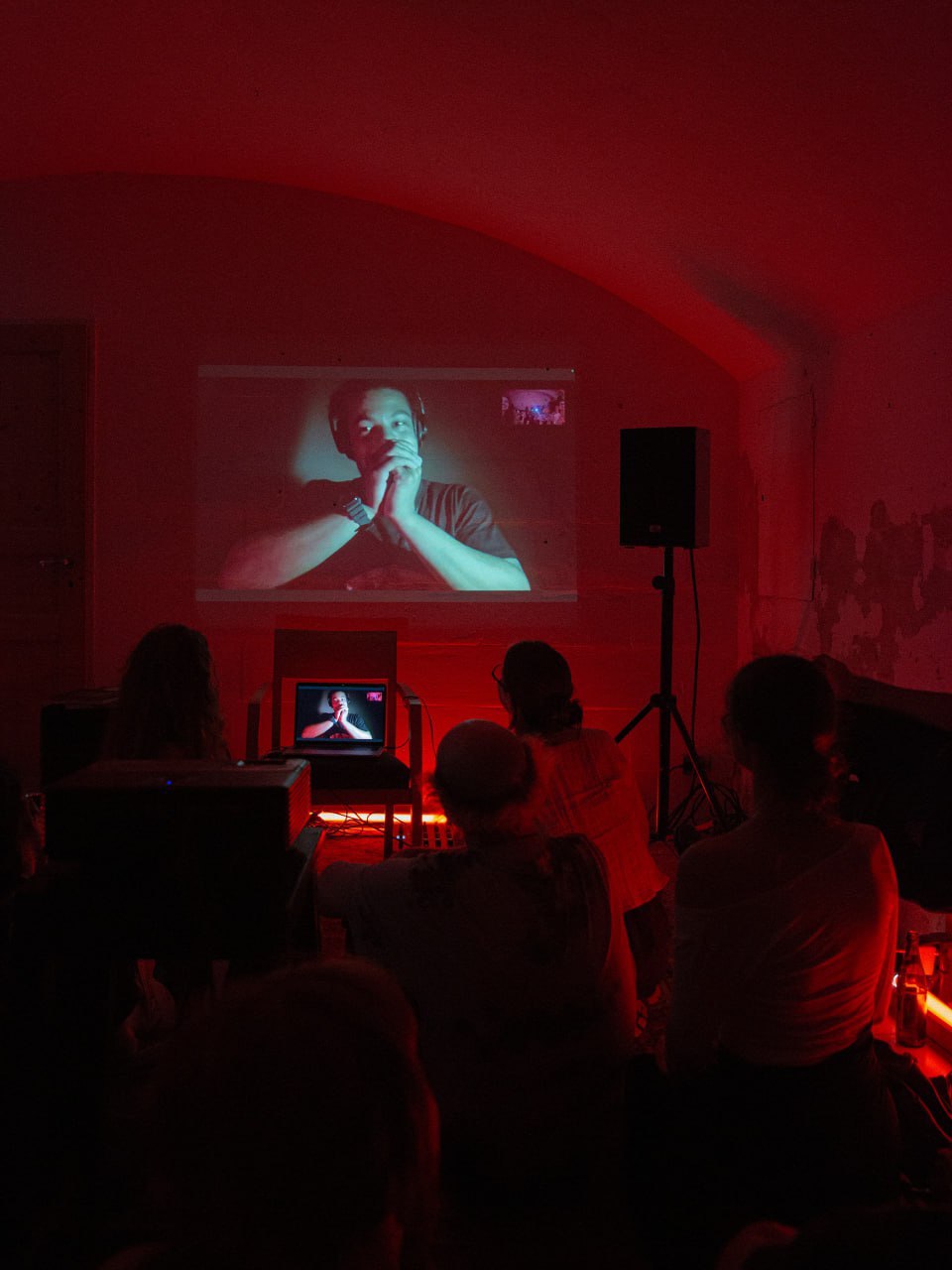
As of recently you take on a more transdisciplinary approach – from listening sessions to music events combined with exhibitions, sound and video installations. How did that change of approaches happen or was it a rather natural development?
Margo: I think it was happening more or less naturally. We needed to find more points of interest a local audience could engage with, because we felt people started to pay less and less attention to what was happening in Ukraine. We felt the urge to show cultural output from Ukraine beyond just films seeing that unfortunately you need to show people what is being destroyed in order to make them care about it. Apart from that I think it was also about sharing different ways of resistance and that there’s not only armed resistance but that this is also happening in culture, in art and alternative communities.
Leo: I realised that I felt a lot of guilt after I’ve rebuilt myself, I’ve restored my mental health, at least to the point where I could go outside and not only be there for myself but also for others. For context, I’m a male person, I left the country during the war, and this is also a very specific position, because all men are obliged to serve in the army, so I was walking in a grey zone of the law, of guilt, of the feelings towards your closest ones, feeling the obligation to stay. This is the background I still have, and it’s an unavoidable one. That’s why at some point I approached Rita and asked about Kriegsbilder and were also talking about the fact that it was primarily film screenings, which opened up a conversation on how we can go further beyond that. So we ended up deciding that it’s important to show Ukrainian cultural gems and artworks which we strongly believe deserve attention, no matter the medium. On top of that, while it is fundamental to fundraise and collect money, it is also significant to invite Ukrainian musicians and artists to show their work since they don’t have that much visibility currently in the Western world, or not even in Ukraine. Especially artists who are serving in the army do not have the capacities to create, show or perform work.
That’s a really interesting point. I remember looking at John Object‘s profile, and his profile bio said “ex-musician”.
Yuliia: I was just listening to an interview of him earlier. It’s really interesting. He talks a lot about music and how it changed for him because of the war, he simply has no time. When he tries to produce music it’s while regular overnight bombings are happening. It’s exhausting.
Margo: We also had a listening session with Mark Panghoud, who is a queer DJ and producer that is now in the army, and they were presenting sound pieces that they produced while they were serving in the army. It was sketches from field recordings and some recordings with a conversation of people working in a village. It literally sounds like an experimental post-club set but it’s all constructed out of this everyday experience and I assume with a very limited amount of tools available to them. We had it as a sound installation at the Ode to Resistance event and a listening session with it.
Did your audience also change with the shift in focus of media, and this transdisciplinary approach?
Margo: Now we actually have a more and more international audience. Creating a community of Ukrainians was quite easy, because everyone felt the need for this space. The really tricky part was actually gathering a local and international audience. At the last event, the collaboration with Shape+ Platform, Construction Festival and Biorhythm, I saw many new faces and it’s always good to see when people are getting pre-sale tickets that we didn’t know yet.. It’s really inspiring. It was something that we were working towards for quite some time, to find the language that would speak to people here in Vienna.
Yuliia: To come to the screening of a movie, even if it’s the biggest movie in Ukraine, you really have to be a cinephile. It can be a niche thing to go to watch some Ukrainian movies somewhere. First you have to find it somehow, if it’s not in a big cinema. It’s also hard to find a space for a screening, because for some movies you really want big screen, they deserve it, and it’s not so easy to find a cinema theatre that is suitable all the time. So it made sense to try out different formats as well.
Rita: I feel that our audience has been rather enriched since the Ode to Resistance. I’ve noticed that the Austrian audience is more interested in the music and performative elements of the program, while Ukrainians are more captivated by the moving images and seek for the community and feeling of home.
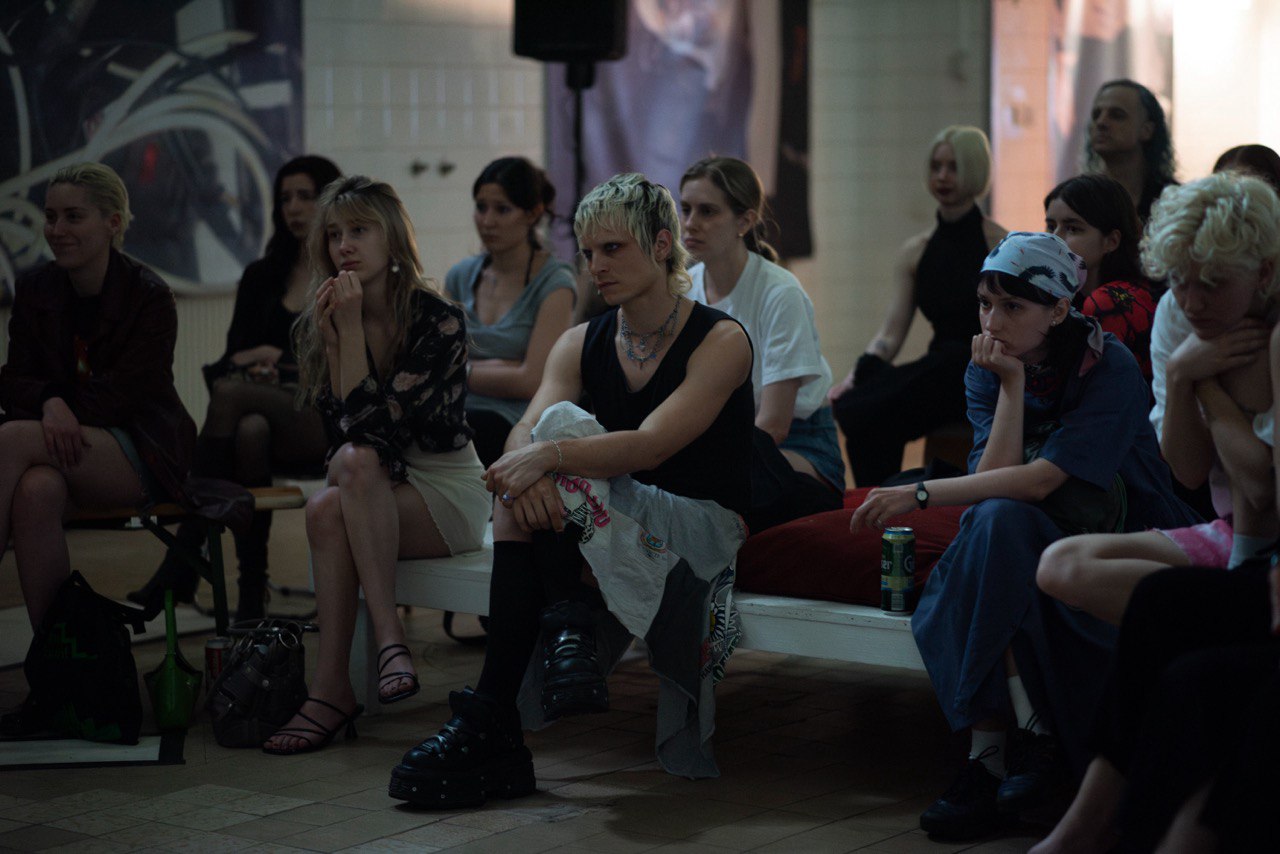
This makes me think of institutions and how you feel about them here in Vienna and how working with certain institutions has been going for you?
Margo: In the very beginning we had this collaboration with the This Human World film festival, and we had the possibility to screen films there. They also had a budget to cover the rights of the screening and all that. But then, I think they were out of budget for this, and their team changed. Since then, we were trying to make our way independently, trying to find space, or trying to host an event somewhere in some smaller institutions. We had that screening at MUMOK, which was quite a big venue for a screening, and it’s an institution, a big institution, but you sometimes still face some restrictions from either the people who invite you or the hosts, so it is easier in the end to do it independently anyway.
But with institutions in Vienna I’m also thinking about the lack of spaces who actually curate their programme in a way that they would become a community space, not just have it be written on their wall. It’s hard to find a space that kind of makes sense conceptually as a venue, as a location. In Ukraine, for example, every independent alternative space, they work very specifically towards their understanding of what they want to host, so you kind of always know what crowd you would get, what’s the target audience. As an organizer you know where you would host events and where you wouldn’t. Whereas in Vienna it’s like, if you can pay and follow some house rules you can rent it out. But at the same time when you try to book the location and you say it’s a fundraiser, everyone’s like: “I’m gonna check with my team. I’m not sure how political we want to be.” It’s tricky, because you’re kind of getting double-checked.
Leo: It’s this idea of post-World War 2 Austrian neutrality, which is stated in the constitution and I feel also young people carry this idea with them on a daily basis somehow.
Yeah, definitely, in Austrian politics and culture this notion of neutrality is very present and people growing up here oftentimes really internalize it. To me it’s just a lie. It just exists on paper. The second Austria can’t be neutral anymore for its own safety, it won’t be. What does it mean to be neutral anyway? Especially if it creates a society where seemingly progressive cultural institutions only double check on certain groups or political efforts. I guess a lot of times it’s about if the funds are going towards military purposes? I think that’s where the internalized notion of neutrality comes in. People love humanitarian aid, but as soon as it comes to military purposes, whatever that means, people get scared even though it’s hard to separate humanitarian aid from “military purposes”.
Margo: At one event we were funding for a router that is needed to get connection, which is a military context and can be used to operate drones, but can save people’s lives.
Leo: For the frontline network is everything. All the communication, all the evacuations, all the navigation for, I don’t know, assault brigades. Basically, everything which gives and takes humans’ lives, in a way, is going through the network. So, no network, you’re lost, you’re blind. So, the network is the eye, actually.
Margo: Coming back to venues and double-checking. That one time where they needed to check with the team first they got back to us saying that it should be fine because they decided that they want to be political. (laughs)
Leo: Double-checking is not curating, that’s also the thing. It’s a suspicion. On a personal level, I received a lot of suspicion from random people who you can meet at a gig, and so on. Especially young, nice leftists, anti-fascists, and so on. Usually they show a lot of this kind of neutral attitude. For me, it’s so strange. It’s so odd, in a way, because actually the anti-fascists should take a stand, a clear one, against fascism.
Yuliia: That’s the thing, what I meant about these stereotypes and, like, it’s very weird to double-check the oppressed. It’s okay to check the oppressor, you know, but the oppressed, it’s probably weird.
I do feel that the Russian propaganda to save Ukraine from its Nazis is very prevalent and that people buy it.
Yuliia: Yes, and there are Nazis, it’s true, just like everywhere else. I saw this video from Vice where they came to Ukraine and were filming some ultra-right guys and framing it as something really big in Ukraine, but again it’s not unique to Ukraine, it’s the same “communities” like everywhere else. Again, it’s this stereotyping. People catch it, as you said from Russian propaganda. What is interesting is that a lot of these groups had their activities funded by Russian money. I don’t know how it is right now, but definitely in the past.
Leo: I mean, we still don’t have any Nazi or right-wing parties in the parliament in Ukraine. Which, if we take a look at Austria or Germany, for me, it’s really strange to hear about Nazis in Ukraine. Hey, take a look at what’s behind your own windows.
“Solidarity converts to responsibility”
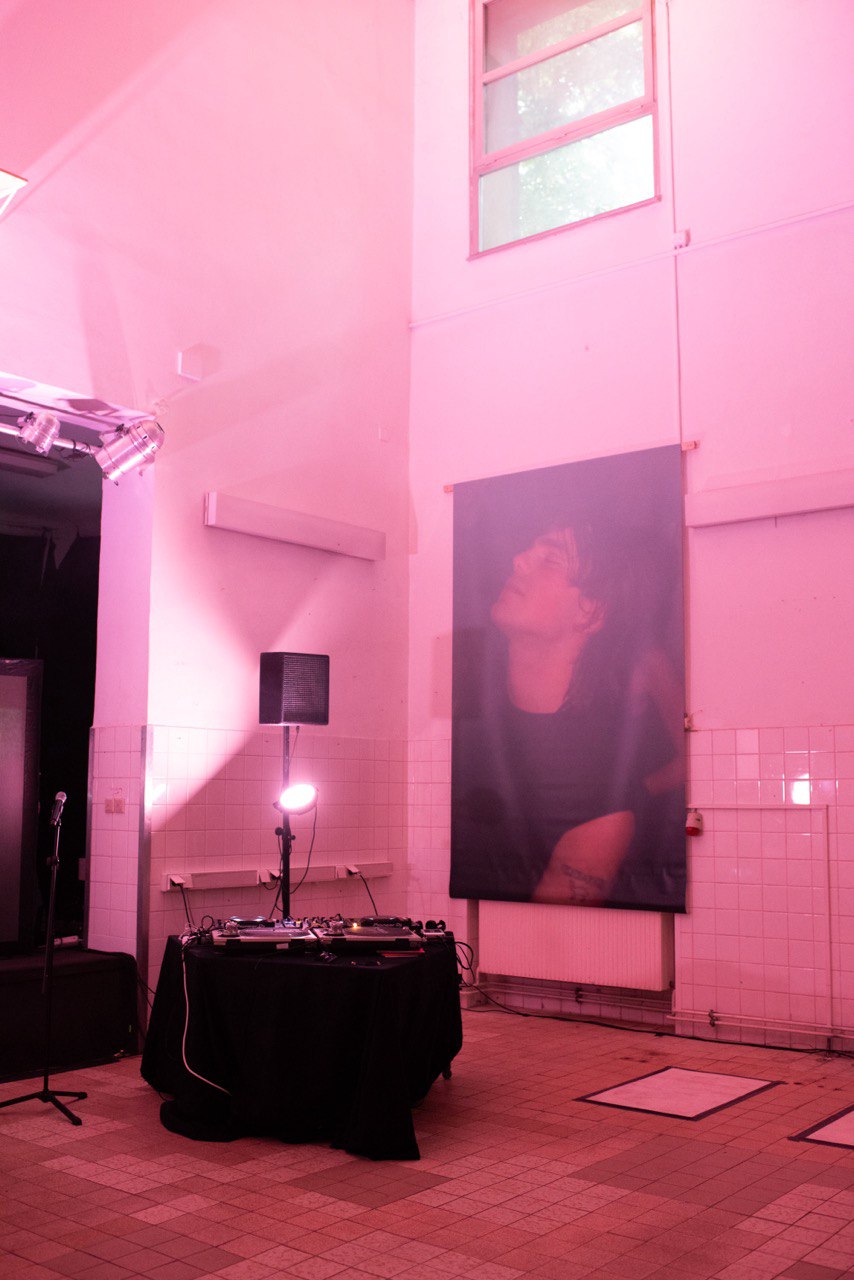
“Awareness about something is not enough really”
Throughout your work processes, as a group, what are you learning about yourselves from each other, especially navigating creative expression and cultural production in the framework of political responsibility?
Yuliia: Definitely, I think I’ve learned a lot from everyone. The greatest thing for me about being part of the team is that I feel that I participate in some direct actions that help to prevent the continuation of Russian aggression, because it has been happening for such a long time, and it’s exhausting, and you really want to stop it, you know. From time to time, I feel this guilt that Margo was talking about before, that this is not enough. I’m questioning myself, what am I doing, like, I actually have to go and become a part of the military. The more people we have there, the more effective we can be, to stop it, to prevent it. It’s not coming from a desire to fight but from the desire for this to stop, finally. I’m learning something about life, that life is not always, bright, good, and happy. Life is a very weird thing, and somehow, you have to learn how to continue living your life the way you want with some horrible things happening in the background, being aware of them, but also do something to make this world a better place. Awareness about something is not enough really, in my opinion. I think it gets too much attention. On the other hand I’ve learned a lot creatively, curatorially and organizationally from working with Kriegsbilder. When you work with other people, you have different opinions, you have to treat your ego correctly, you know. You can do something that’s bigger than yourself. It’s the support we can give, the discussions that come up.
Margo: I agree. It feels like we are creating something that every one of us is lacking. I feel like I’m recreating experiences that I partially had, and some experiences that I never had. It’s nice to share a vision, and then actually make it happen and to talk about the topics that we find important.
Leo: Working together in a team gives me the feeling that thinking big is not something which is only reserved for some people on the Olympus, huge creators with a huge budget in museums. I’m gaining consciousness and accepting even the wildest ideas and sharing it with no fear. We can also have fun together while we are dealing with a situation that is very gloomy. Solidarity converts to responsibility. It’s connected to thinking big. You can show more complex constellations, you have more eyes, and your audience is bigger. Solidarity through support and words converts to money. You see that you are changing something, at least on a small level. It’s not a lot but at least it’s something. I think this political responsibility starts with the point where you are not lost, and to know that you’re on the side of the road where you want to be.
How do you navigate balancing grief and anger while organising and hosting your events?
Margo: I think we’re trying to have fun and just make it happen. What is happening in Ukraine right now is all very mixed, all of the grief, all of the tragedy, all of the war crimes that are happening. If I scroll Instagram, it’s like a story with a number of people who were killed during a Russian attack, and then the next one is a meme about something else that is happening in the country. There’s really a lot of memes about the war, some of them are cultivated in a more symbolistic, patriotic style, it’s weird. So you can feel that there’s a need for humor or whatever, some irony. Even if you’re working on something that is that complex it’s just a natural coping mechanism, and I usually can’t afford it when I’m by myself, because I’m taking myself too seriously. However when you’re in a group, it’s easier to express it in a way that would not be harmful for people around you and also wouldn’t be necessarily harmful for yourself. Most of the things come from grief, sadness, despair and from the urge to do something. You cannot run away from these emotions.
Yuliia: It’s true, it’s a coping mechanism. Recently the artist Marharyta Polovinko, who was in the military died and I didn’t know her personally, but we had a lot of common friends, so it was a very personal thing for me. She was also my age, she’s also an artist, but she made a different choice, she went to the army and I really felt like shit because I didn’t do that, you know. You constantly have to reflect on your decisions.
“being non-political means that you’re losing one of your senses”
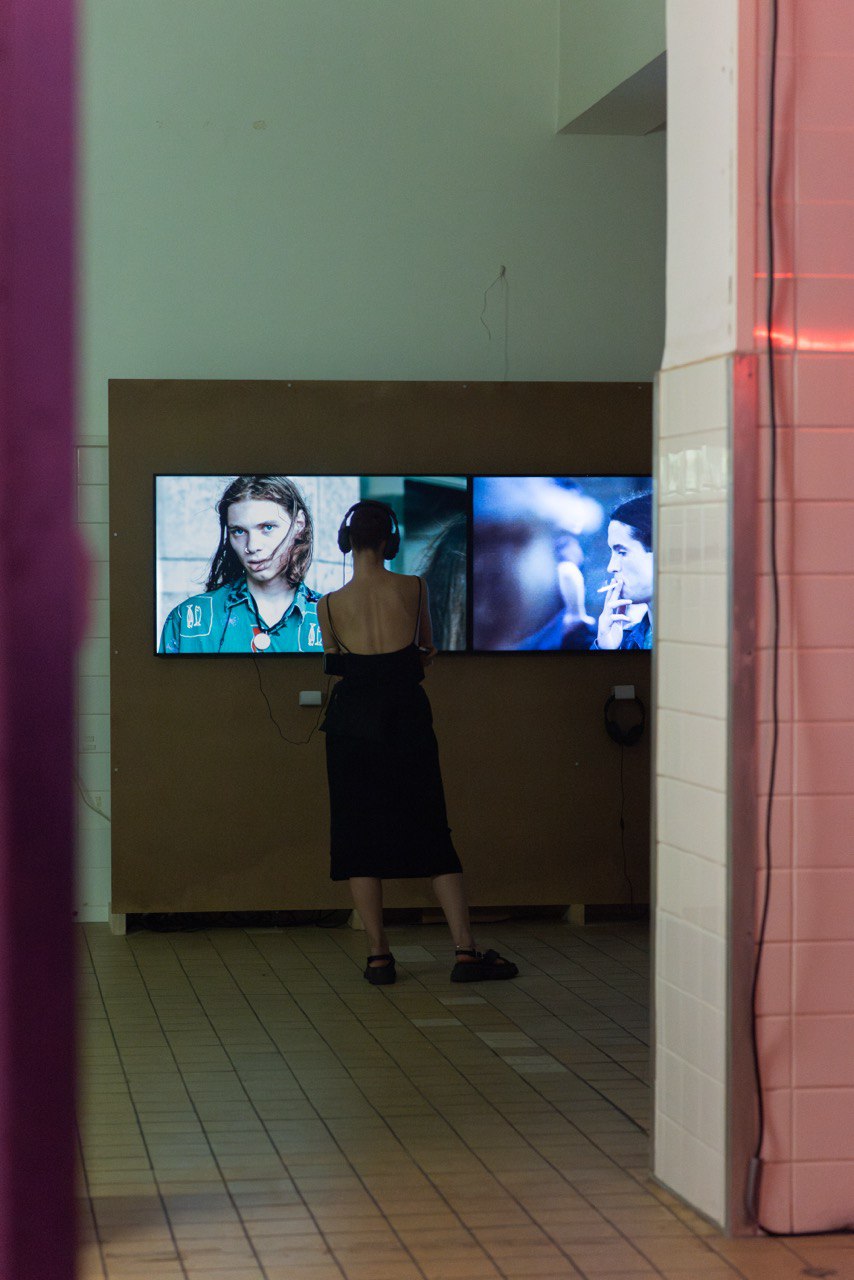
Lately the debate around politics in art and culture has intensified – is art inherently political? What are artists and cultural producers’ political responsibilities? Who has the privilege to ignore politics? Do you have any thoughts on this?
Leo: It’s a complicated thought. When I hear political responsibility I think of actors in politics. Institutional politics. I’m really trying to apply the idea of political responsibility to artists. I think the word political is not necessary here because it’s enough to just be responsible. It’s enough to be responsive. I think in these terms, being non-political, it means that you’re losing one of your senses, basically. It’s like hearing, touching, and all this stuff. Being responsible is being responsive. I really adore this formula. It’s like being in a dialogue. It’s quite abstract, I know, but it’s just being connected.
Yuliia: We live in a world that is political. Art is part of this world. So it’s impossible to be non-political. How can all this not be political? Being apolitical is already political. Then you are just passive to something that is happening. This is political because you are not taking any action.
Margo: I think the responsibility is mainly about what spaces you are creating. To whom you provide a space. Who you give a voice to and how this place is used. At the same time, I think there is also a lot of privilege in being political in a cultural way. Because as we said, a lot of Ukrainian artists, for example, don’t have access to be in institutions, make events, present their work, be on stage, be present or talk about where they stand on a topic publicly because they are doing something else. Something that wouldn’t be happening if there was no war. So I think it is also a big privilege that you can be in a safe place and take this opportunity to be political. So show the voices of people that cannot speak right now.
With your events you are usually/always fundraising for Ukrainian organisations. At your last event with Construction, Biorhythm, and SHAPE+ Platform you raised money for KHARPP, an organization helping Ukrainians in frontline areas. All the funds went towards purchasing and renovating a new home for a family from the frontline village of Novopavlivka in the Dnipro region. If I remember correctly you raised around 1.6k, which is incredible and hopefully helps the family out rebuilding a new home. Can you talk about how you pick the organisations you’re fundraising for? What are aspects that are important to you regarding deciding who to support?
Yuliia: Mostly it’s for friends, organizations of friends or people that we know who’d need it. Otherwise we also ask the people we are working with, directors for example, what they think we should fundraise for. Personally, I think it’s important that it’s rather small organizations or volunteer groups, because they always need money and it’s not as easy for them to reach people as it is for larger organizations.
Leo: We don’t need to have a lot of discussions around where to send the money. Usually when we are working on an event someone of us see’s that someone is doing a fundraiser and it aligns with the timeline of our event. Then we all agree to support them. For our audience, it’s easier to understand that we are not buying a huge rifle or a helicopter, I think. So, even if we do something around the infrastructure of the military, it is still on the humanitarian aid side of things or the infrastructure of the network in the case of Mark’s Brigade. Basically we’re just trying to be aware of the fundraisers of our colleagues and close friends. You don’t need to look for them, they are finding you, actually.
Margo: It tends to be artists and musicians that we know or are friends with. Fallout Noise, for example, are partly supporting musicians that are at the front line, as far as I know. It happens naturally through the media and social environment we’re in.
Yuliia: KHARPP was a suggestion by Construction, one of our collaborateurs on the event.
Leo: Everyone needs funds. With this fundraiser through KHARPP, when I found out that it is for a family from Novopavlivka, which is basically in the region where I’m from in Ukraine, I immediately thought yes, we should do it.
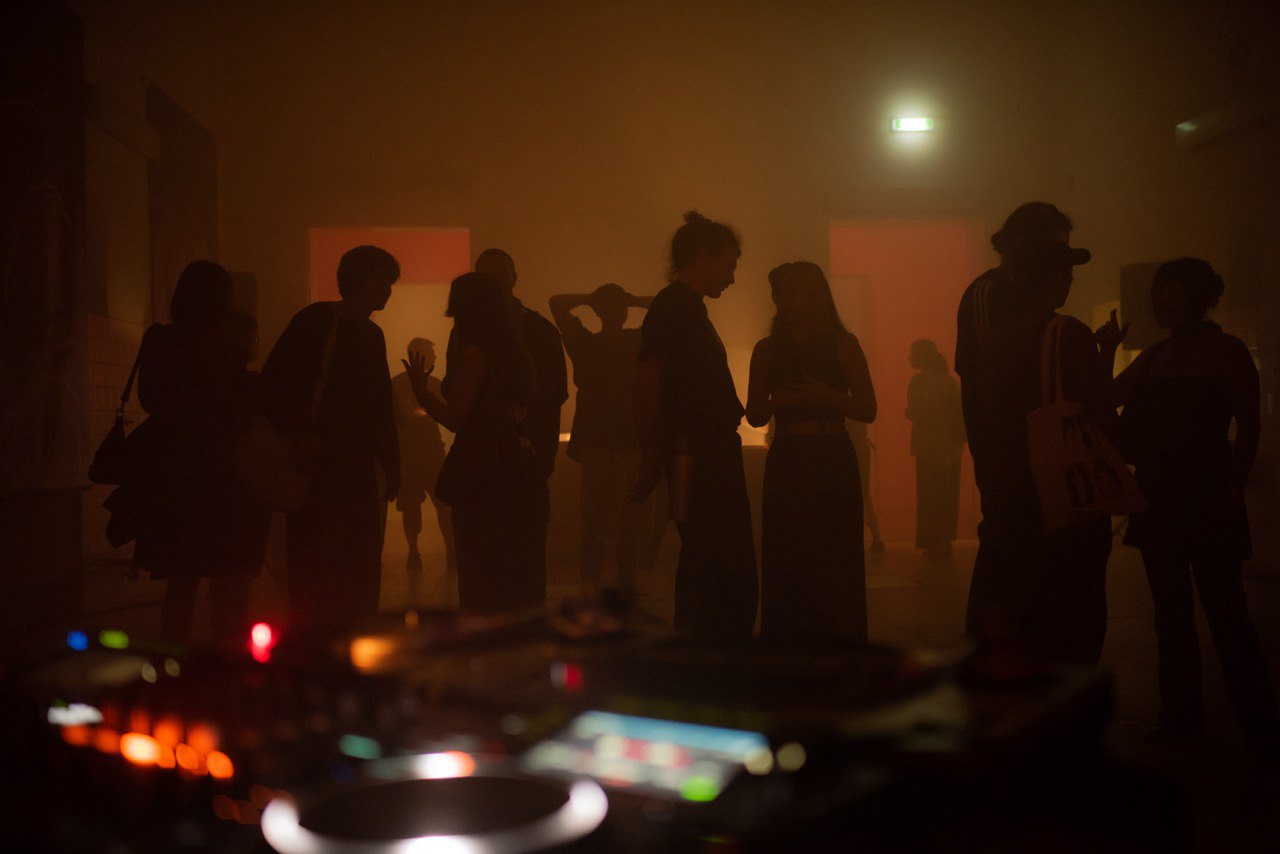
Donations and financial support can be useful tools in terms of political solidarity. In your opinion, how can solidarity from non-Ukrainians extend beyond donating money?
Leo: It’s a really good question, actually. I’ve been thinking about that. It’s a good start to just ask “how are you?”, and if you have questions on a personal level about what’s happening in Ukraine, I’m always happy to answer them, really. A genuine question, I will always be happy about. Also, inviting Ukrainian artists and musicians, doing collaborative projects, any sort of interpersonal solidarity act is super valuable, I think. Another way, especially for people who have a EU passport, go and vote every time you have an opportunity. You can join a Ukrainian demo or push your local governments to give weapons to Ukraine. There are so many acts of solidarity and small things one can do, institutionally sustainable things, which really can change the flow of the war.
Yuliia: As I mentioned before, our goal is to share what Ukraine is and talk about it, to help people understand this war and our relationship with Russia. It’s about decolonization of your ideas about Ukraine and other countries and lands that are considered as part of Russia. I think it’s important to educate yourself, because it affects what you’re doing. If you are educated on this, then you’ll find ways on how to be in solidarity with it.
Margo: I’d like to add that being curious is sometimes enough, being genuinely curious. Until you make yourself interested in a topic, no one will. It’s really about your personal interest and your personal urge to be aware, because it’s actually super close. It’s closer to Vienna than I think Frankfurt, that’s what I was comparing it to the last time I was talking about it. It’s really important to know how Russia works as an oppressor and which mechanisms it uses, because it’s not only about Ukraine. I feel like people in Europe should do it not only because they care for Ukraine, but because they also care about themselves. It’s important to trace how imperialism works. We are very good at reflecting on them, when they are in the past, but we need to apply this in the present. Additionally, just talking about this with your friends or bringing this up in conversations and discussion or a kind of more casual context can be really helpful. I feel like when Ukrainians are talking about the war, it’s this thing where people assume you are talking about this because you’re traumatized, but if a person who actually has no ties to Ukraine is raising this as a topic, I feel like it, unfortunately, this brings more value to the topic in an international context.
Rita: I would say that the general solidarity and understanding of the processes that can lead to financial support is not just useful but is really crucial for Ukraine. Many things in our country depend solely on self-organization, volunteer movements, and people’s readiness to donate additional funds, regardless of the taxes they pay or military aid packages from America or Europe. There are foreign voluntary battalions as well. Recently, Kyiv hosted the ICKPA music festival, organized by the founders of the Georgian techno club Bassiani, where I had the opportunity to work this year. Posters with QR codes were hung throughout the venue, allowing people to donate to the Georgian battalion, for example. In other words, support and solidarity can range from simply reading a short instagram post about the recent state of things or taking an interest in events like ours to a willingness to defend Ukrainian land side by side with Ukrainians.
Can you give us an insight in your plans for the future, any projects or events coming up?
Yuliia: Yeah, we will have a screening at Fortuna in autumn. It was like an open call from the university, and we applied for it with a film that we really wanted to show, “Where Russia Ends” and also invite the director for a talk. The approach in this film is very interesting. It’s a documentary film, but it’s fiction.
Leo: A film by Oleksiy Radynski, our beloved Ukrainian, Kyiv-based film director. He was leading a cinema club in one of the most leftist universities in Ukraine. He’s an outstanding speaker and great at delivering decolonial thoughts. It’s an interestingly done movie, based on the archive of KyivNaukFilm. It contains videos from Siberia, and from the expeditions where Ukrainian Soviet operators have been filming the extracted regions in north of Russia. There you have a lot of resources like oil and gas which Russia has speculated on for a long time, having a lot of these resources under their control.
Additionally we might do an exhibition as part of Sonic Territories. We also haven’t done a listening session for the fourth edition of Drones for Drones in Vienna yet, which we still would like to organize, but this is for when we don’t have anything else to do. (laughs)
Thank you so much for your time and work!
Margo, Leo & Yuliia: Thank you!

This article is brought to you by Struma+Iodine as part of the EM GUIDE project – an initiative dedicated to empowering independent music magazines and strengthen the underground music scene in Europe. Read more about the project at emgui.de
Funded by the European Union. Views and opinions expressed are however those of the author(s) only and do not necessarily reflect those of the European Union or the European Education and Culture Executive Agency (EACEA). Neither the European Union nor EACEA can be held responsible for them.